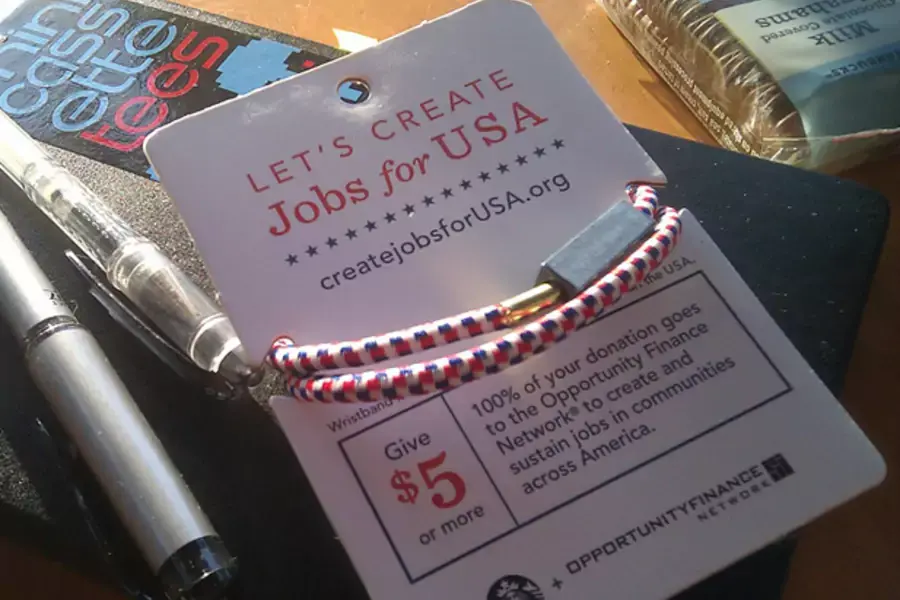Starbucks, Charity, and Job Creation: An Odd Mix That Could Actually Work

More on:
I am rarely surprised when I go to Starbucks. The coffee is always about the same (good), and the menu of pastry items is thoroughly predictable (and not so good). But the other day, amidst the CDs and other miscellany at checkout, I noticed a small badge asking for a $5 donation. “Let’s Create JOBS for USA” it implored, offering a snazzy red, white, and blue wristband in return.
I was taken aback. I have donated to help poor children, to end famines, to cure and prevent diseases, to help the homeless, to build bike trails, to save wild animals and wild places, and dozens of other causes. But it had never occurred to me to make a charitable contribution to “create JOBS.” Have we as a country really sunk this far? Must we now rely on charity to employ Americans?
So I asked my research assistant Jane McMurrey to have a deeper look. The story is this. Since November 2011, Starbucks has partnered with an organization called the Opportunity Finance Network, which is a revolving fund that provides financing for community development financial institutions. These are essentially small lenders such as credit unions that make loans to community businesses and other enterprises that would otherwise lack access to capital.
There is a real gap here. Hal Sirkin of the Boston Consulting Group, who has been doing superb work on the improving prospects for American manufacturing, noted recently in Business Week that we are seeing far fewer small business start-ups than a decade ago, which is hampering job creation. In 2000, he wrote, there were more than 630,000 companies in the United States less than a year old, and they employed 4.6 million people; in 2010, there were just over 500,000 start-ups, and they employed fewer than 2.5 million people. The big problem, he argues, has been limited access to credit.
The Opportunity Finance Network and other similar enterprises are trying to fill that hole, and they have a good track record of doing it in a responsible way. From its launch in 1990 through the end of 2009, OFN has provided $125 million in financing to the lenders in its network. These institutions have collectively offered $10 billion in financing to borrowers shunned by traditional lenders, which has created or maintained an estimated 135,000 jobs, built 86,000 housing units and contributed to community projects like the construction of charter schools. Write-offs are less than 2 percent of loans.
Encouraging small business startups is one of the few things Democrats and Republicans agree on these days. Congress recently passed, and President Obama signed, the Jumpstart Our Business Startups (JOBS) Act making it easier for new companies to raise funds from small investors.
The Starbucks campaign, a personal initiative of CEO Howard Schultz who has rightly called the current level of unemployment “a national jobs emergency,” will provide a real boost to OFN’s resources. As of the end of March 31, the latest figures released, Starbucks says that “Create Jobs for USA” has raised over $7 million, including an initial $5 million donation from Starbucks, which has been leveraged into $50 million in loans resulting in the creation or retention of about 2,300 jobs. Fairly small, but a good start. Google Offers and Banana Republic recently agreed to support the initiative as well, and other companies are being urged to join.
It makes some practical sense. Schultz has rightly figured out that one of Starbucks’ assets is that it has millions of customers who come in regularly and drop $4 or $5 on a coffee drink. If even a handful of those pay another $5 for a wristband, that adds up to a lot of money that can leveraged into worthwhile, job-creating projects through community finance.
I wrote a couple of months ago on the efforts being made by the Harvard Business School to persuade companies to invest in building the competitive capacity of the United States, through education, job-training, and building networks of local suppliers. The Starbucks initiative, despite my initial skepticism, seems like an innovative effort to do exactly that.
Now excuse me, I’m going to go get a cup of coffee and a wristband.
More on:
 Online Store
Online Store
